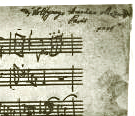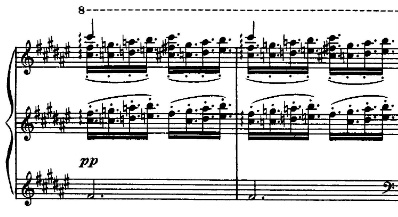Patterns of rising and falling inflection are vital to a lot of music. Purely instrumental music often encodes emphasis-patterns that resemble speech, or song. (Linguists prefer the term "intonation" to signify these rises and falls.) In the notation of European classical music, at least since the 18th century, musicians have used "slurs" as a means of indicating phrase groupings and stress patterns. Describing two notes written under a slur, … [Read more...]
4 Trombones
Paris, 2014 Arnold Schoenberg gave Rudolf Serkin an assignment. (This story is hearsay; worthy of attention, in my opinion.) Consider the opening of Mozart's A-Minor piano sonata, Schoenberg asked Serkin. What is the right instrumentation for this music, if it were to be scored for orchestral instruments? Mozart: Sonata in A Minor, KV 310 (300d) Serkin's answer included an oboe playing the upper melody line, and strings taking the … [Read more...]
Other Planets
Recurring patterns of signification in music -- topoi. The grand unfolding of time and space represented by a steady repeated-pitch ostinato with slow-motion harmonic change around it, found at the opening of Haydn's Creation, for example. (Haydn could have had a career in sci-fi futurism...) I heard a pianist play through Debussy's prelude "...La terrasses des audiences du clair de lune." Near the end, there's an anomalous passage that … [Read more...]
Amphora
In earlier museum practice, shards of ancient decorated pottery were pieced back together with missing sections reconstructed and plausible designs painted in. Missing parts of an image were supplied by restorers. As exhibited, those restored vessels had complete surface decoration. Some fragments were antique; the rest, the painted-in parts, made a whole pot look as it might have before it was broken. Today, it's more likely that the missing … [Read more...]
Quick Change Artist
A distinguishing trait of Mozart's music is rapidly and frequently changing character, Affekt, or mood. He's a quick change artist. For the 21st-century listener, it's simplistic to hear only a single unvarying Affekt or character in an entire movement of old music. We tend to hear the changes. Mozart's music may offer an extreme, an almost constantly shifting and evolving rendering of human state-of-mind. It's classical-sonata … [Read more...]





